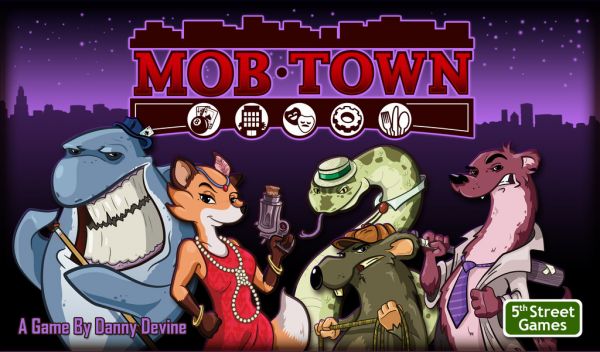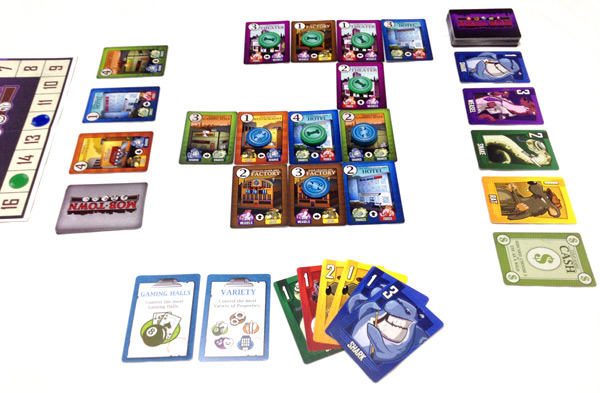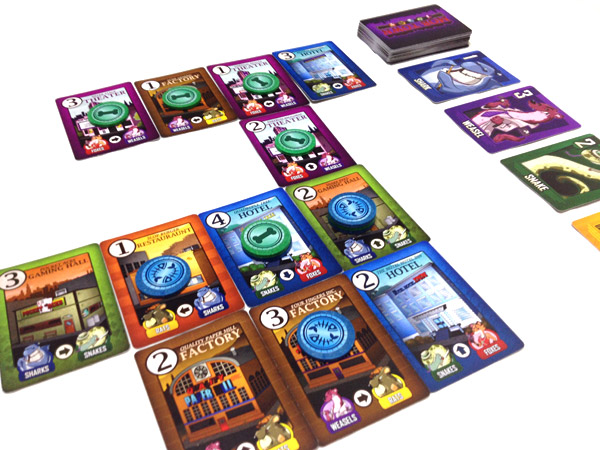Mob Town: A Kickstarter Preview

The big city is full of opportunity, with plenty of everyday people doing their best to earn an honest living. But you're not one of them — you're one of the most corrupt mobsters around, and you're willing to employ as many thugs as you need to take over the city's businesses and get rich. But you'll have to watch out for the other mobsters, who'll do anything to snuff you out, and the cops, who are closing in fast.
Such is the setting of Mob Town, a new casual game for 2 to 4 players from 5th Street Games, now on Kickstarter. We recently played a prototype of the game to find out if it lives up to 5th Street's other fun casual games.

Gameplay
The object of Mob Town is to score the most points by gaining control of property cards, as well as fulfilling secret agendas. The game consists of 3 rounds. During each round, a different city is constructed using a certain number of property cards.
Each property card contains a small arrow that determines where the next property card will be placed. To construct the city, the first property card is placed in the center of the table, and each subsequent card is placed in the next open space above, below, to the left, or to the right of it, depending on the direction of the arrow on the previous card. Property cards also contain a point value and two suits (animals) that can take over the property.

After reviewing the city's layout, each player chooses 2 agenda cards which, if successfully completed, will each score 3 bonus points at the end of the round. Agendas include controlling the most properties, the most of a particular type of property (hotels, restaurants, factories, etc.), the most variety of properties, and the most connected properties.
A draw deck contains gangster (animal) cards of different point values, cash cards that serve as wild cards, and The Law card, which is shuffled into the bottom 10 cards of the deck. Each player is dealt 3 cards at the beginning of each round and 5 cards are placed in a row on the table to form the lineup. During the course of each round, players collect the cards they need and use them to obtain control of properties in the city, which will ultimately determine the score. Player tokens are placed on a card to indicate which player controls it.
On a turn, the player chooses one action to carry out from any of the following options:
- Draw 2 cards from the top of the deck.
- Trade 1 card for all of the cards of one type from the lineup (the lineup is refilled back to 5 cards).
- Discard a cash card for any 3 cards from the lineup (the lineup is refilled back to 5 cards).
-
Take over a property by discarding cards with a total value equal to the property's value, plus 1 for each token already on the card.
- If the new property is not directly adjacent to one he already controls, the player must discard 1 card (or give it to the controlling player, if there is one) for each property in between. This is called a connection cost.
- The cards must match either of the suits (animals) shown on the property card. Cash cards can be used as a 1 of any suit.
- After discarding, the player places one of his tokens on the card (or on top of a stack of tokens already on the card).
- Trade in a briefcase token (each player gets 3 at the beginning of the game) to place an additional property card in an empty space anywhere in the town and optionally take it over.
- Swap one agenda card for a different one.
When The Law card is drawn, the gig is up! The round ends immediately and players score the face value of each property they currently control (i.e., their token is the topmost token on the card), as well as 3 bonus points for each agenda successfully achieved. After the third round, players also add 2 points for each unused briefcase token. The player with the most points is the winner and ultimate mob boss.

Review
Mob Town is a great casual game that we had a whole lot of fun playing. The animal artwork and subtle humor (e.g., Four Fingers Factory and Farfrum Broadway Theater) give it a distinctly light-hearted feel, despite the mobster theme. The gameplay itself is solid, offering many options for light strategic planning, yet it speeds along by only allowing one action per turn. It hardly feels like there is any downtime — before you know it, the cops show up and put the kibosh on your plans.
The mechanic for randomly building a different town layout works well. Each round, the city ends up quite different than the last. This spices things up by keeping players on their toes — the strategies and agendas chosen for the previous round may not be the best for future rounds. The agendas themselves are also an interesting addition, offering players bonuses for fulfilling specific goals that may or may not coincide with those of other players. The bonuses are relatively low, but can certainly swing the outcome of a round. Preventing an opponent from fulfilling an agenda by taking over key properties (and thus driving up the cost to take it back) is often worthwhile, especially if doing so aligns with one or both of your own agendas. But your opponent can always swap out his agenda for a different one, if need be.
The ability to add a new property to the city adds even more choices, and can introduce sudden twists in the gameplay. Because of the connection cost for new properties not adjacent to others you own, taking over properties that are near one other is important. But if you find yourself in a bind, adding a new property by paying a briefcase token allows you to jump to another area of town without having to pay connection costs. This can be very beneficial at the right times.
Mob Town is a great choice for casual gamers who already have some gaming experience. It plays smoothly, is competitive without being overly confrontational, and is definitely fun. The inclusion of many choices on a turn provides plenty of opportunity for strategy, meaning that even more serious gamers can get plenty of enjoyment from this casual game. However, the trade off is that someone who is completely new to gaming (i.e., Uno players) might need a bit of guidance at first. And, while the game will be fast-paced for most players, there is some risk of slowdown for players who are prone to over-analyze on their turn.
If you're interested in this worthy project, be sure to check it out on Kickstarter through March 9, 2014. For international backers, 5th Street will be offering free international shipping for the first time.
Pros: Solid casual game, competitive play, smooth mechanics, lots of replayability, many options for strategy
Cons: Brand new gamers may need a bit of guidance, some risk of "analysis paralysis" for players who are prone to it
Disclosure: this preview is based on our evaluation of an unpublished prototype of the game, which is subject to change prior to publication. While a modest payment was received to expedite the review process, our thoughts and opinions expressed here are honest and accurate.




